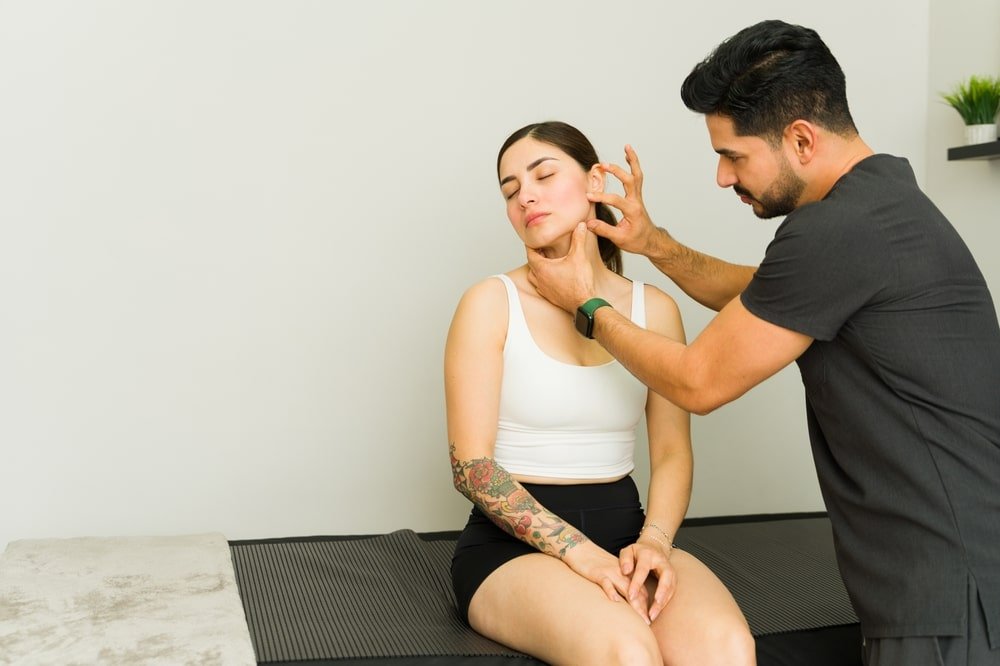Do you wake up with a sore jaw, unexplained headaches, or ear pain that just won’t quit? You’re not alone. Many people experience these frustrating symptoms, often without realizing the silent culprit: chronic psychological stress. It’s a powerful, often unseen, force that can manifest physically in surprising ways, particularly in your jaw. At White Tooth Dental, led by Dr. Kristina Pahuta, we believe in a holistic approach to oral health, understanding that your mouth is an integral part of your overall well-being.
This means looking beyond just your teeth to the deeper connections, like the intricate link between your mental state and your physical symptoms, especially when it comes to jaw clenching and pain.
The Unseen Connection: Stress, Your Jaw, and Your Well-being
Imagine your body as an alarm system designed to protect you. When faced with a threat, real or perceived, this system goes into “fight or flight” mode.

While incredibly useful for escaping danger, prolonged activation due to chronic stress can lead to a host of physical symptoms, and your jaw muscles are often on the front lines.
This persistent tension often leads to two interconnected issues: bruxism and Temporomandibular Joint (TMJ) disorders.
Understanding Bruxism: More Than Just Grinding
Bruxism is the medical term for teeth grinding or jaw clenching. It can happen consciously or, more often, unconsciously, both during the day (awake bruxism) and while you sleep (sleep bruxism).
Awake bruxism: This is often characterized by subconscious clenching or bracing of the jaw, especially during periods of concentration, stress, or anxiety. You might find yourself clenching while driving, working, or exercising.
Sleep bruxism: This is an involuntary grinding or clenching of teeth during sleep. It’s often harder to detect without a partner noticing the sounds, but its effects—like worn tooth enamel or jaw stiffness upon waking—are unmistakable. According to the American Academy of Sleep Medicine, sleep bruxism affects about 10% of adults.
Whether awake or asleep, bruxism puts immense pressure on your teeth, jaw muscles, and the delicate temporomandibular joints.
Decoding TMJ Pain: When Your Jaw Joint Acts Up
Your temporomandibular joints (TMJs) are the two joints connecting your jawbone to your skull, one on each side.
Think of them as tiny, complex hinges that allow you to chew, talk, and yawn.

Temporomandibular joint disorders (TMDs) occur when problems arise with these joints or the surrounding muscles.
Common symptoms of TMD include:
Jaw pain or tenderness
- Pain in or around your ear
- Difficulty or pain while chewing
- Clicking, popping, or grating sounds when you open or close your mouth
- Locking of the jaw joint, making it difficult to open or close your mouth
- Facial pain or stiffness
While other factors like injury or arthritis can cause TMD, chronic bruxism, particularly stress-induced clenching, is a significant contributor.
The constant strain from clenching and grinding can inflame these joints and overwork the surrounding muscles, leading to pain and dysfunction.
This is an “aha!” moment for many: those mysterious headaches, earaches, or neck stiffness might actually stem from your jaw!
The Hidden Link: How Stress Tightens Your Jaw
So, how does emotional stress translate into physical jaw tension? It’s rooted in our primal biology.
When you experience stress, your body’s sympathetic nervous system kicks into action, releasing stress hormones like cortisol. This prepares your body to react: muscles tense, heart rate increases, and blood pressure rises.

For ancient humans, this response was vital for survival, preparing them to fight or flee.
Today, however, our stressors are often chronic and psychological—demanding jobs, financial worries, relationship issues—and there’s no physical threat to run from.
So, where does all that heightened physical readiness go? Often, it gets bottled up as chronic muscle tension, especially in the “clench-ready” muscles of the jaw.
This creates a vicious cycle:
- Stress mounts: Daily pressures and worries accumulate.
- Muscles tense: Your body’s stress response causes involuntary muscle contraction, including your jaw muscles.
- Bruxism ensues: This chronic tension often leads to unconscious clenching and grinding.
- TMJ pain develops: The constant strain and pressure irritate your jaw joints and muscles.
- Pain increases stress: The discomfort and disrupted sleep from bruxism and TMJ pain, in turn, contribute to even more stress, intensifying the cycle.
This feedback loop highlights why simply treating the pain isn’t enough; addressing the underlying stress is key for long-term relief.
Recognizing the Signs: Are You Clenching Unconsciously?
One of the biggest challenges with stress-induced bruxism is that it often happens without you even realizing it, especially during the day.
You might be focusing intently on a task, caught in traffic, or deep in thought, and your jaw is silently clenching.
Here are some tell-tale signs and awareness techniques:
- Morning Jaw Soreness: Waking up with a stiff, tired, or sore jaw is a classic sign of nocturnal bruxism.
- Headaches: Tension headaches, especially in the temples, are common.
- Earaches: Referred pain from jaw muscles can feel like an ear infection, but your ears are perfectly healthy.
- Sensitive Teeth: Worn enamel and micro-fractures from grinding can lead to tooth sensitivity.
- Dental Impressions: You might notice imprints of your teeth along the sides of your tongue.
- Facial Pain: General aching or tenderness in your face, especially around the cheeks.
Awareness Check-In:
Throughout your day, pause and ask yourself:
- Is my jaw clenched right now?
- Are my teeth touching? (They shouldn’t be, unless you’re chewing or swallowing!)
- Is my tongue resting lightly against the roof of my mouth, just behind my front teeth, with my teeth slightly apart? (This is the ideal resting posture.)
If you notice yourself clenching, gently remind your jaw to relax. This simple practice can significantly reduce tension over time.
Taking Control: Practical Steps for Relief and Prevention
The good news is that you can break the stress-bruxism-TMJ cycle.
It often requires a multi-faceted approach, combining immediate relief with long-term stress management.
Immediate Relief Strategies:
- Warm Compresses: Applying a warm, moist cloth to your jaw muscles can help relax them.
- Gentle Massage: Gently massage the muscles around your jaw, temples, and neck with your fingertips.
- Soft Diet: For a few days, stick to softer foods to give your jaw muscles a break.
- Avoid Chewing Gum: Continuous chewing can exacerbate jaw muscle fatigue and pain.
Jaw Exercises for Relief & Rehabilitation:
Simple exercises can help stretch and relax your jaw muscles.
(While I can’t provide live visuals here, imagine gentle movements to open and close your mouth, moving your jaw side-to-side, and gently stretching your neck). Consistency is key!
Lifestyle Interventions (Beyond the Obvious):

Mindfulness & Relaxation: Techniques like deep breathing, meditation, and yoga can help manage stress responses. Even a few minutes of quiet reflection can make a difference.
Sleep Hygiene: Prioritize quality sleep. A consistent sleep schedule, a dark and cool bedroom, and avoiding screens before bed can improve overall sleep, potentially reducing nocturnal bruxism.
Caffeine and Alcohol: These can disrupt sleep patterns and increase muscle tension. Consider reducing your intake, especially before bedtime.
Posture Awareness: Poor posture, especially hunched over a computer, can strain your neck and jaw muscles. Regular breaks and ergonomic adjustments can help.
When Professional Help Becomes Your Best Friend
While self-care strategies are powerful, some cases of bruxism and TMJ pain require professional intervention.
A dentist experienced in TMD can accurately diagnose the issue and recommend appropriate treatments.
Dental Interventions:
Custom Mouthguards/Splints: Unlike over-the-counter guards, a custom-fitted mouthguard (occlusal splint) from your dentist can properly align your jaw, protect your teeth from grinding, and reduce muscle strain. This is often a cornerstone of treatment.
Dental Corrections: In some cases, misaligned teeth or bite problems may contribute to bruxism or TMJ issues, requiring restorative solutions or orthodontic work.
Medical and Holistic Treatments:
- Medication: In some instances, muscle relaxants or pain relievers may be prescribed for short-term relief.
- Botox Injections: For severe, persistent cases, Botox injections into the jaw muscles can temporarily relax them, reducing clenching strength and pain.
- Physical Therapy: A physical therapist can provide targeted exercises to improve jaw mobility, strengthen supporting muscles, and correct posture.
- Psychological Support: Cognitive Behavioral Therapy (CBT) can be highly effective in helping individuals identify and manage stress triggers, often leading to a significant reduction in bruxism and TMJ symptoms.
At White Tooth Dental, our commitment to comprehensive dental care means we assess your unique situation, considering all contributing factors.
We work to find solutions that integrate dental, lifestyle, and where necessary, medical approaches, all centered around your comfort and well-being.
Your Path to a Relaxed Jaw and a Calmer Life
Understanding the powerful link between stress, bruxism, and TMJ pain is the first step toward relief.
By becoming more aware of your body’s signals and actively engaging in self-care and stress management, you can significantly improve your jaw health and overall quality of life.
Remember, you don’t have to suffer in silence. Our family-oriented dental practice in Toronto is here to guide you with compassionate, personalized care.
We believe in educating our patients, empowering them to make informed decisions about their health.
Frequently Asked Questions About Stress, Bruxism, and TMJ Pain
Can stress cause earaches?
Yes! The jaw joint (TMJ) is located very close to the ear. When the jaw muscles are tense or the joint is inflamed due to bruxism, the pain can radiate to the ear, often mimicking an ear infection, even when the ear itself is healthy. This is a common “referred pain” symptom of TMJ disorders.
Is TMJ pain permanent?
Not necessarily. While some TMJ disorders can become chronic, many cases are temporary and can be effectively managed with conservative treatments, lifestyle changes, and stress reduction techniques. Early intervention is key. For more complex cases, professional dental and medical care can provide significant relief and long-term management.
What’s the best mouthguard for bruxism?
For optimal results and protection, a custom-fitted mouthguard (occlusal splint) provided by your dentist is generally far more effective than over-the-counter options. Custom guards are precisely molded to your teeth, ensuring proper fit, comfort, and jaw alignment, which is crucial for reducing muscle strain and protecting your teeth.
How long does it take to get relief from stress-induced jaw pain?
The timeline varies for everyone, depending on the severity and duration of your symptoms, and how consistently you apply self-care and professional recommendations. Some people experience relief within a few weeks of implementing stress management and jaw exercises, while others with chronic issues may require several months of consistent treatment and lifestyle adjustments. Patience and persistence are key.
Can diet affect jaw clenching?
While diet isn’t a direct cause of clenching, certain dietary habits can exacerbate symptoms. Hard, chewy, or crunchy foods can strain your jaw muscles. Caffeine and alcohol can increase muscle tension and disrupt sleep, potentially worsening bruxism. Focusing on softer foods and reducing stimulants can help ease the burden on your jaw.
Ready to Explore a Holistic Approach to Your Jaw Health?
If you’re experiencing symptoms of bruxism or TMJ pain, or if you simply want to learn more about how to protect your oral health, we invite you to connect with White Tooth Dental.
Our team is dedicated to providing personalized care that considers the full picture of your health.
Learn more about our comprehensive dental care offerings, including cosmetic dentistry options to restore worn teeth, restorative solutions for any damage, prompt care for emergency dental needs, and sedation options for anxious patients.
We’re here to help you achieve a healthier, more comfortable smile.



